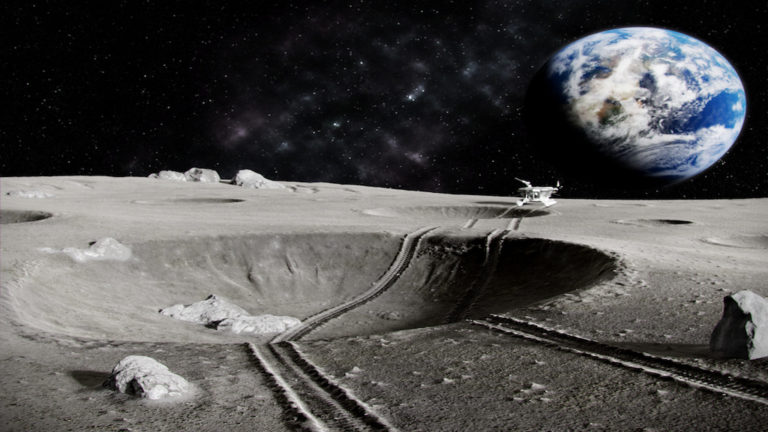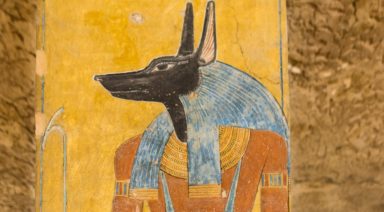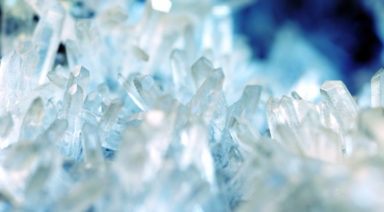China’s Yutu-2 Rover Finds Mysterious Gel-Like Substance on Moon

China’s Chang’e 4’s Yutu-2 probe is on the dark side of the moon, making conspiracy theorists slide to the edge of their seats. As part of the China Lunar Exploration Project and China National Space Administration, the moon landing took place earlier this year, setting its unmanned rover loose on the most mysterious lunar landscape. And it seems they have found something unique — a gel-like substance that is, thus far, unexplainable by scientists back on Earth.
China on the Dark Side of the Moon
For millennia people have stared up at the moon and speculated what might be going on in the regions that seem always to be on the opposite side of what appears to be illuminated from Earth. This dark side stares out onto the cold, endless, forbidding landscape of deep space.
Cruising Around the Lunar Surface
The Planetary Society reported, “Though no real science results have emerged yet, scientists involved stated in Nature Geoscience that the landing site shows ‘potential evidence of excavated deep mafic material, which could reveal the mineralogy of the lunar mantle.’” Mafic material is a fancy word for igneous rock rich in magnesium and iron.
Outfitted with a panoramic camera, Yutu-2, the Chinese moon rover is relaying compressed images to Earth that, among other things, have shown features near the ‘Statio Tianhe’ landing site. Since its touchdown earlier this year, Yutu-2 covered a total of 271 meters (890 feet) as it continued Westward of the landing site in Von Kármán Crater.
With China on the moon, a lot of progress is being made in the minds of eager scientists who are busy analyzing the data collected thus far. Analysts reported that the Lunar Penetrating Radar (LPR) experiment aboard the rover has returned “very interesting radar data for lunar subsurface analysis” along the roving route.
But perhaps the most unusual find on the Chinese space mission is one that continues to baffle scientists. The online publication Space reported that Yutu-2 stumbled on an unusually colored, ‘gel-like’ substance during lunar day eight.
According to one report “the rover had been due to power down for one of its regular ‘naps’ just prior to the discovery, but when the anomaly was spotted, engineers decided to postpone the process so that it could be investigated. The discovery prompted scientists on the mission to postpone other driving plans for the rover, and instead focus its instruments on trying to figure out what the strange material is.”
One Chinese space agency explained that on July 28, 2019, during a round of panoramic photography, “someone monitoring the rover spotted a ‘gel with a mysterious luster’ sitting in the centre of the crater. It couldn’t be identified from a distance, but whatever it was, it clearly stood out from its surroundings. ‘The fascinating colors seem to imply its extraordinary life,’ the news site went on to explain.”
An article appearing in Smithsonian.com suggests another yet-unproven idea: “In the absence of details…the announcement has led to speculation. The most likely explanation…is that the lustrous spot isn’t really a gel, but is some form of shiny melted glass created when a meteorite struck the moon.”
At this point, laypersons and scientists alike are waiting until someone gets to the bottom of this gelatinous finding to put speculation to rest. Meanwhile, Chinese moon rover pictures continue to amaze and intrigue heaven-gazers around the globe. Only time will tell (unless of course we get only the “official” story) whether the dark side of the moon has been harboring secrets all along.
The Hollow Moon Theory; Is the Moon an Artificial Satellite?

The moon is often described as having divine, feminine energy – the female counterpart to our Sun. It is a source of cosmic phenomena, providing us with beautiful eclipses, changing tides, and hopefully a future staging point for missions to Mars and beyond. But when we start to look at the moon under a closer lens, a number of aberrant characteristics suggest that it might be hollow — and that there may be a secret moon base.
The Moon Rings Like a Bell
The Apollo missions and subsequent moon landings have been at the center of controversy and conspiracy for years. There has been an interminable debate as to whether we actually landed on the moon, what was found there, or to what extent NASA has been hiding information from us. But amid the quarreling and speculation, the number of anomalous features on the moon has puzzled scientists and conspiracy theorists alike.
Toward the latter end of the Apollo missions, NASA astronauts placed seismic recording devices on the lunar surface to document artificial and natural moonquakes. Their equipment recorded activity ranging from meteorite strikes to man-made explosions, and crash landings of Apollo rockets. Even the sun’s heat created seismic activity when it caused the moon to thaw on a daily basis.
The astronauts were given a series of ALSEPs, or Apollo Lunar Surface Experiment Packages to set up seismographs and initiate detonations ranging from shotgun-like charges to mortars with multiple grenades. Eventually, NASA intentionally crash-landed the Apollo 12 module as well as the S-IVB rocket setting off an explosive force equivalent to nearly 12 tons of TNT.




































